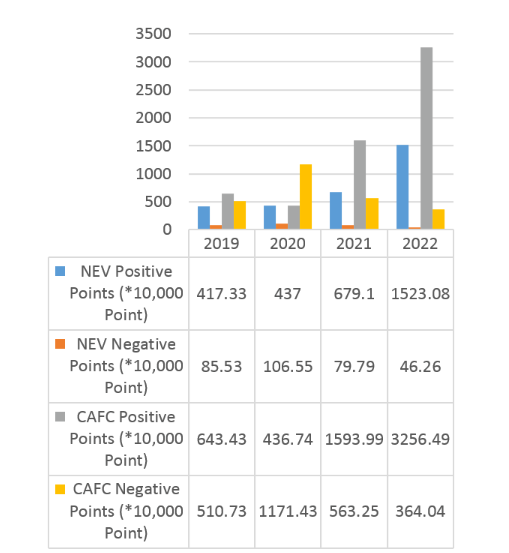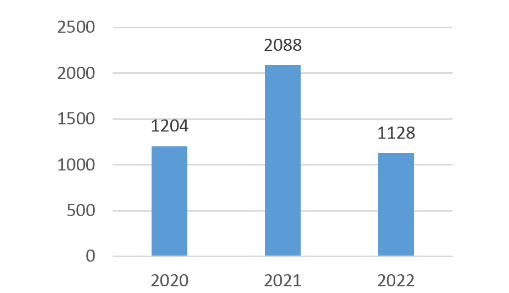On June 29, 2023, the Ministry of Industry and Information Technology (the “MIIT”), the Ministry of Finance, the Ministry of Commerce, the General Administration of Customs, and the State Administration for Market Regulation jointly released the Decision on Revising the Measures for the Parallel Point-based Administration of Corporate Average Fuel Consumption and New Energy Vehicles for Passenger Vehicle Enterprises (the “2023 Amendment”), which will come into effect on August 1, 2023.
I. Background to the 2023 Amendment
On September 27, 2017, the MIIT released the Measures for the Parallel Point-based Administration of Corporate Average Fuel Consumption and New-Energy Vehicles for Passenger Vehicle Enterprises (the “Parallel Point-based Measures”), which then came into effect on April 1, 2018. This policy tool was introduced to gradually replace the subsidies policy for NEVs (as defined below; please refer to our article “MIIT Released New CAFC and NEV Points Administration Measures” for more details).
Following the implementation of the Parallel Point-based Measures, MIIT issued the Decision on Revising the Measures for the Parallel Point-based Administration of Corporate Average Fuel Consumption and New Energy Vehicles for Passenger Vehicle Enterprises in June 2020. The aim was to adjust the Parallel Point-based Measures and it took into account factors such as maintaining a balance between market supply and demand and price stability (please refer to our article “MIIT Revised the Parallel Point-based Measures” for more details).
From a policy mechanism perspective, the Parallel Point-based Measures were an institutional effort to establish a market-based mechanism for coordinating the development of energy-saving technologies and NEVs. It administers corporate average fuel consumption (“CAFC”) and the production volume of new energy vehicles (“NEV”) in parallel, using a points system. Since its implementation in 2018, the MIIT, along with the other four departments, has organized five rounds of point transactions, with a cumulative transaction amount exceeding RMB 25 billion1.
Before the enactment of the 2023 Amendment, China’s NEV market in 2022 experienced significant growth. The Development Plan for the New Energy Vehicle Industry (2021-2035) proposed a strategic objective for NEV sales to reach approximately 20% of the total sales volume of new automobiles by 2025. However, according to data from the China Association of Automobile Manufacturers, the sale of NEVs in 2022 reached 6.887 million units, accounting for 25.6% of the total vehicle sales. The target was surpassed three years ahead of schedule2.
With the growing market share and penetration rate of NEVs, the effectiveness of the Parallel Point-based Measures in market regulation is gradually diminishing. Recent statistics indicate the following trends in the point-trading market:
1.Surplus of positive points: According to the Annual Report on the Corporate Average Fuel Consumption Points and New Energy Vehicle Points for China’s Passenger Vehicle Enterprises in 20223 published by the MIIT, both the CAFC and NEV positive points in the market are considerable higher than their negative counterparts. As illustrated in the diagram below, CAFC positive points have experienced a substantial increase, surpassing CAFC negative points by a wide margin. This is primarily attributed to the rise in NEV production, which simultaneously drives up CAFC and NEV positive points. When calculating CAFC points, the fuel consumption derived from the electric energy consumption of NEVs is considered as zero consumption until the end of 2025. Moreover, points could be multiplied as a reward for NEV production. The significant expansion of NEV production has also led to a substantial surge in CAFC positive points. The detailed statistics for 2022 CAFC Points and NEV Points reveal that the leading holders of CAFC points include BYD, Tesla, SGMW and GAC Motor, all of which have a strong presence in the NEV production sector.

(Figure 1 – Statistics of CAFC Points and NEV Points for 2019 – 2022 Source: the announcements of points of various years published on MIIT’s official website)
2. Significant reduction in point transaction prices: Due to the ample supply of positive points in the point-trading market, the average transaction price for NEV points in 2022 was RMB 1,128 per point. This was a decrease of 45.9% compared to the previous year. Given the current surplus of positive points, without any policy adjustments it is expected that point transaction prices will continue to decline sharply. Consequently, passenger vehicle manufacturers may find that the costs involved in investing in the R&D of energy-saving technologies outweigh the expenses associated with directly purchasing NEV positive points. This outcome runs counter to the original intention of the Parallel Point-based Measures, which aimed to incentivize the development of energy-saving technologies in passenger vehicles.

(Figure 2 – 2020-2022 Average Point Transaction Price Source: the annual reports of the implementation of the Parallel Point-based Measures of various years published on MIIT’s official website)
Given this, with the rapid development in the NEV industry, the MIIT has further revised the Parallel Point-based Measures due to the necessity of keeping the supply and demand balance and the achievement of “dual carbon” goals.
II. Main Revisions in the 2023 Amendment
The 2023 Amendment introduced the following revisions to the Parallel Point-based Measures:
1. Adjustment of the NEV points calculation method
Considering technological advancements and cost reductions, the 2023 Amendment reduces the average score assigned to standard vehicle models in NEV point calculations by approximately 40%. Correspondingly, the upper limit of NEV points was also adjusted. For instance, the upper limit for pure electric passenger vehicles has been reduced from 3.4 points to 2.3 points, while the upper limit of points for fuel cell passenger vehicles has been reduced from 6 points to 4 points.
The 2023 Amendment explicitly states that the MIIT has the authority to make further adjustments to the NEV points calculation method as needed based on actual conditions. We understand that this provision grants MIIT the flexibility to adapt the calculation method of NEV points in response to market fluctuations and stabilize the supply and demand relationship.
2. Establishment of a NEV point pool system
The 2023 Amendment introduces a new chapter on the Management of the New Energy Vehicle Point Pool, aiming to address imbalances in the market supply and demand relationship. The NEV point pool system allows passenger vehicle enterprises to store or withdraw NEV positive points as follows:
Storage: When the combined NEV positive points of all passenger vehicle enterprises exceed 200% of the total sum of NEV and CAFC negative points, the point pool will be activated. Passenger vehicle enterprises have the option to voluntarily store their NEV positive points in the point pool. However, the quantity of points stored should not exceed the product of the enterprise’s NEV positive points in the previous year and the specified storage ratio. NEV positive points stored in the point pool are not subject to the annual conversion ratio requirement, and the validity period for storage is five years.
Withdrawal: When the combined NEV positive points of all passenger vehicle enterprises do not reach 150% of the total sum of NEV and CAFC negative points, point pool withdrawals will be permitted. However, the quantity of points withdrawn should not exceed the product of the NEV positive points stored in the point pool and the specified withdrawal ratio.
The MIIT will determine whether to open the point pool based on the supply-demand situation of CAFC and NEV points for all passenger vehicle enterprises before July 30th each year. If the decision is made to open the point pool, the MIIT will announce the storage ratio or withdrawal ratio for that year, along with the relevant implementation plan.
3. Mechanism adjustments in the context of “dual carbon”
The 2023 Amendment introduces requirements for passenger vehicle enterprises regarding the public disclosure of their carbon emissions. It specifies that by June 30th of each year, the previous year’s average carbon dioxide emissions of passenger vehicle enterprises should be calculated according to the evaluation method outlined in the Fuel Consumption Evaluation Methods and Targets for Passenger Vehicles. This emission data will be included in the calculation report of CAFC and NEV points for passenger vehicle enterprises, which will then be published together.
The 2023 Amendment also mentions that the MIIT, along with the other four departments, will explore establishing a cohesive mechanism between the point system outlined in the Parallel Point-based Measures and other carbon reduction systems. This initiative will be based on the development of the industry and the need for carbon emission management. It indicates a growing emphasis on managing carbon emissions in the automotive industry under a “dual carbon” strategy.
The 2023 Amendment also includes optimizations to various point management mechanisms, including but not limited to extending the deadline for submitting reports on the offset of negative points and completing the offset, allowing the use and carryover of purchased positive points, and adjusting the statistical benchmarks for vehicles within the accounting year.
III. Comments and prospects
When the subsidies for NEVs began to decline in 2017, the Parallel Point-based Measures were introduced. Through its innovative CAFC and NEV parallel point-based system and management model, it has successfully achieved the policy objectives of replacing NEV subsidy policies and stimulating the research, development, and production of NEVs by passenger vehicle manufacturers, and has supported the State’s policy of vigorously developing NEVs.
Since then, the Parallel Point-based Measures and related systems have undergone continuous amendments and updates, incentivizing and promoting the development of energy-saving and NEVs in the domestic passenger vehicle sector. In 2023, six years since it was implemented, China’s NEV market has transitioned from policy-driven to market and product-driven, solidifying its leading position globally. The “New Forces” in the automotive industry and traditional passenger vehicle enterprises have significantly enhanced the competitiveness of China’s NEV products through continuous technological advancements and product upgrades. Consequently, more and more consumers are actively choosing NEV products over traditional internal combustion engine vehicles.
The Parallel Point-based Measures, as a “visible hand”, have effectively achieved their original intention and fulfilled their policy mission, playing a crucial role in shaping and promoting the development of China’s NEV market. Now the market itself can guide and support the industry as an “invisible hand”. Under the guidance of “dual carbon” policies, it is expected that the future parallel point-based system will integrate with the enterprise carbon emission system. Regulators will gradually shift to impose new technological development directions and compliance requirements on automotive enterprises, focusing on carbon emission reduction. Ultimately, this may lead to the replacement or cancellation of the parallel point-based system. The future cohesive mechanism between the parallel point-based system and the carbon emission trading system will be the primary focus for both the market and the industry.

For further information, please contact:
WANG, Kai, Partner, JunHe
wangk@junhe.com
1. Source: Annual Report on the Implementation of Parallel Point-based Administration of Corporate Average Fuel Consumption and New Energy Vehicles for Passenger Vehicle Enterprises (2023), published by Equipment Industry Development Center of MIIT
2. Source: China Ranks First in the World in the Production and Sales of NEV for 8 consecutive years, China’s Government Website (www.gov.cn)
3. MIIT’s official website: https://wap.miit.gov.cn/zwgk/zcwj/wjfb/gg/art/2023/art_e81faddbea574ff38a446276e5eb71b6.html





